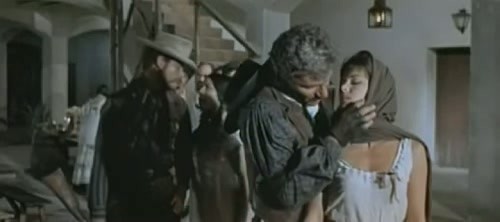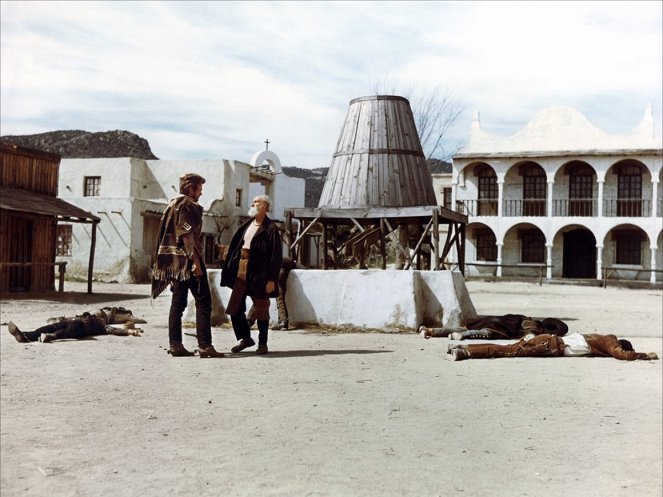Regie:
Sergio LeoneMusik:
Ennio MorriconeBesetzung:
Clint Eastwood, Marianne Koch, Gian Maria Volonté, Wolfgang Lukschy, Sieghardt Rupp, Josef Egger, Antonio Prieto, José Calvo, Margarita Lozano (mehr)Streaming (4)
Inhalte(1)
Zwei rivalisierende Gangsterbanden terrorisieren die Einwohner des Ortes San Miguel. Der schweigsame Fremde Joe beschließt, in das gefährliche Spiel einzugreifen. Er lässt sich von beiden Sippen anheuern und bewahrt den Schein, an ihren kriminellen Geschäften interessiert zu sein. Tatsächlich spielt der Fremde die Banden gegeneinander aus, um an deren Goldvorräte zu kommen. (ORF)
(mehr)Videos (1)
Kritiken (7)
Ein Auftakt … Aber was für einer! Wenn sich Joe die Rüstung unter den Poncho schmiedet und sich beibringt, mit verstümmelten Händen zu schießen, läuft es mir kalt den Rücken runter – und schuld daran sind die drei Herren Eastwood, Leone und Morricone. Danke, Jungs. Das Duell am Ende des Films ist zum Teil wunderbar als Duell von Schuhen gefilmt, was zur damaligen Zeit sicher etwas derart Besonderes war, dass allen Western-Regisseuren hundertprozentig die Augen herausgefallen sind. Das geschieht ihnen recht. Wenigstens hatten sie die Gelegenheit bekommen, sich auf das vorzubereiten, was ein paar Jahre später noch kommen würde.
()
This is where it all began. For westerns, for Eastwood and also maybe for Leone. The day when a gunslinger arrived in a small town. The story is simple, but nice, the same as the characters in it. And Clint straining snappy lines through his perpetual cheroot is just delicious. When a man's got money in his pocket he begins to appreciate peace.
()
A beautiful example of how a rigid genre can be pushed somewhere simply by being ignorant of its rules. Many of Leone's trademarks came about practically only by the fact that nobody on set (except Eastwood, who again didn't speak Italian, so he couldn't tell them much) realized that this is simply not how you make a western. A Fistful of Dollars isn't the first Spaghetti Western (there were 20-30 of them at the time), but it's the first one that didn't copy Western techniques. It messed with everyone's head at the time, and the early reviews were pretty fierce, for example, but I totally understand the unique experience it gave rise to in its day and why it was such a hit with audiences. The palpable heat, the sweat, the ugliness, the dust, the thirst, and the sleeping with one eye open. The familiar stuffiness of a forgotten frontier in a time when one could get lost over the horizon. An adventure that does not surrender its naturalistic aspects. Except for the blood, which was probably done by the catering girls.
()
This cult Western was practically created at the same time as one of my favorite films, Lemonade Joe, which programmatically opposes exactly what Leone did here. That means emphasizing genre clichés, the naivety of the plot, and an unrealistic view of historical events and actions. In the case of Leone's film, nostalgia doesn't work for me at all, which influences, in some cases, more than just my assessment of films, as I didn't see this film during my adolescence. Of course, A Fistful of Dollars is the beginning of the subgenre of spaghetti Westerns, it is a recognized classic, and naturally, I easily find within it practically everything that led to Leone's success. Excellent camera work, scenes designed to maximize the most fundamental human emotions, a sharp contrast between positive and negative characters, cuts to sweaty, bearded faces, and wild gleam in the eyes, a great sense of film detail, and superb casting, which, among other things, helped Clint Eastwood rise to stardom. However, I have a very lukewarm relationship with westerns, as I've mentioned in my reviews several times, so I can't overlook many of the film's unfinished aspects. Leone was still finding himself in this filmmaking genre and honing his directing style. While I forgive genre clichés much more readily in other entertaining genres that I like more, I am unforgiving here. For example, key scenes such as the attack on the military convoy or the destruction of Baxter's hideout are poorly shot and practically cry out for parody. Notice the dozens of male characters, who, after being shot in the chest, tense up, grab their heart, and slowly stagger to the ground with a typical motion. Overall, the script is naive, and a person simply has to turn off their brain. In his later films, Leone added much greater depth of thought, and new motifs, and even Morricone delivered much more emotional performances. When it comes to westerns, I prefer a more realistic style, for example, as demonstrated by the Coen brothers in their new film True Grit. This film lacks much of what I appreciate in cinema, such as realism, rawness, and the internal logic of the story. On the other hand, there are plenty of aspects that repel me from this genre. Overall impression: 40%.
()
Leone’s first foray into western territory meant the arrival of a legend. This Kurosawa remake turned out particularly well and although Sergio was still fine-tuning his directing style to perfection, this is an amazing work. Of course, it can’t compete with Leone’s later masterpieces, which changed the face of cinema forever, but compared to the vast majority of other westerns (and other movies regardless of genre) its quality takes it to completely other spheres. ♫ OST score: 4/5
()



Werbung